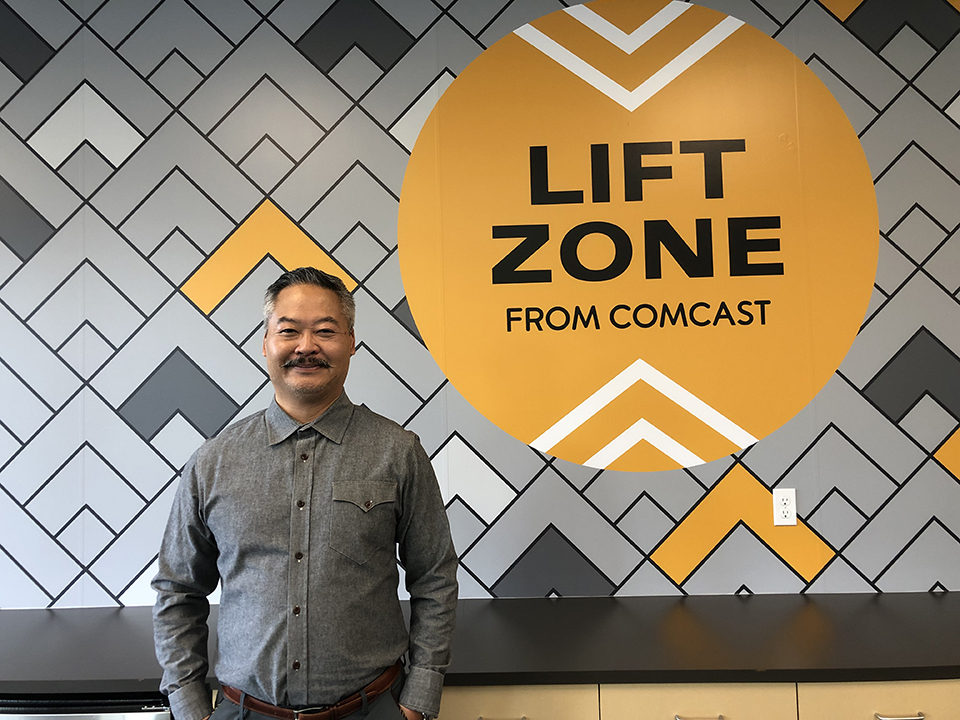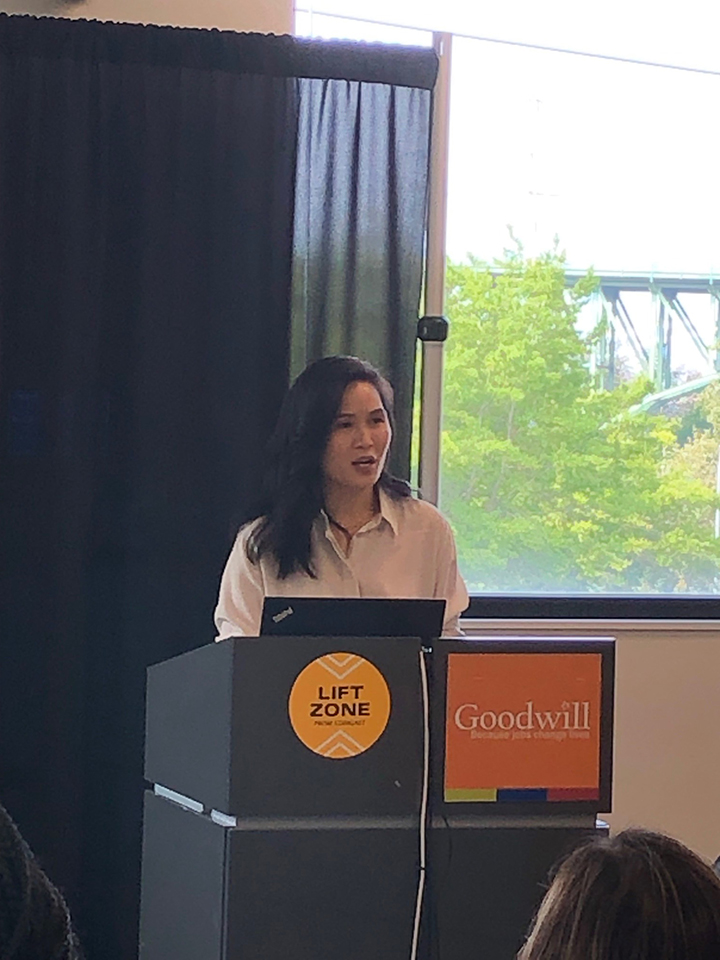By Kai Curry
Northwest Asian Weekly
On Sept. 13, 2022, Comcast Washington and Evergreen Goodwill (EG) hosted an executive meet and greet breakfast for organizations around Puget Sound who are taking part in Comcast’s Lift Zone labs initiative to network and share how they are using technology to achieve digital equity.
Attending organizations, some from farther afield, such as Easter Seals in Bremerton and Boys and Girls Club in Lynnwood, had the opportunity to share how they use their labs.
“We retrofitted our multipurpose rooms down on the first floor…focusing on bringing digital equity for our older adults, who were very isolated for a very long time during the pandemic, through our Club Bamboo program,” shared Michael Byun, executive director of Asian Counseling and Referral Service (ACRS). “We’re now able to provide a situation where it’s immersive for both, those who are in person and those who are still uncomfortable, with coming in person.”
What is a Lift Zone? It is a hosted space of boosted internet where community members can use computers in a safe environment. In 2020, Comcast announced its intention to provide over 1,000 Lift Zones around the country. In western Washington, though, and in Spokane, at the Carl Maxey Center, Lift Zones look different as they are labs with advanced technology for multiple uses, such as facilitating presentations with an app that turns your phone into a microphone.
“We not only want to provide you with Wi-Fi, we want to give you upgraded technology…to make sure that you have all the tools you need…to support your community, support your programs, make sure everyone can get the education [that they need]. It looks different depending on the organization,” explained Kiwa Nidas, who handles external affairs for Comcast Washington.

Dalila Wilson-Scott, Comcast EVP and Chief Diversity Officer, with ACRS Executive Director Michael Byun. (Photo by Kai Curry)
Comcast executives flew in from Philadelphia and Denver to meet and greet with the local nonprofits utilizing these Lift Zone labs. Dalila Wilson-Scott, executive vice president, chief diversity officer, and president of Comcast NBCUniversal Foundation, spoke freely during the networking session, and then addressed the attendees at large.
“This Lift Zone lab concept that we have here is unique to the region. These have even more customization, more functionality, designed around who comes to the center…These are more co-designed with the partner.”
Everyone’s concern in 2020 was providing a safe space for students to attend online classes during the pandemic. Once this urgent need eased, organizations saw the opportunity for expanded applications of the Lift Zone. Everyone agreed that none of it was possible without pre-existing relationships between places like ACRS and their client base.
“You could bring all the technology in the world, but if you don’t have great people that [say], ‘I know what you need when you come in. I can direct you.’…You have to have people that bring them in, make them feel welcome, ‘What can I do here?’ and show them the skill set.
When we go deeper with the programming partners to co-design it, we get a much better result,” Wilson-Scott said.
“In our case, when we think about digital literacy and access, we’re talking about equity for our immigrants and refugees, where, depending on where they are in their lives and their backgrounds, they have different challenges [re:] accessing technology,” Byun continued.
During the pandemic, it became clear that some communities were being left behind. Wilson-Scott, whose mother is Vietnamese, corroborated this claim.
“[My mom] would rather spend all of her day with Vietnamese people than anybody else. Before COVID-19, she wasn’t so excited about being online…[now], she goes to a center near her…For her, it’s important that whoever is there is specifically familiar with Southeast Asian culture, which is different.”
Wilson-Scott discussed with Byun the importance of organizations representing those they serve. “People lump AAPIs together…You can look at representation in tech space…and see high numbers for the Asian population, but when you break down by income and where in Asia, it’s a whole different story…A lot of Asians are being served by organizations that are led by other communities. That’s one [part] of the digital equity effort that we’re trying to get better at…At the end of the day, it’s all about trust. People aren’t going to sign up, they’re not going to come in for a program, if they don’t trust the place, the people.”

Huan Do, Evergreen Goodwill Senior Director of Finance, Contracts, and Program Strategy. (Photo by Kai Curry)
The breakfast was hosted in the space that EG uses for its Lift Zone lab. Huan Do, EG’s senior director of finance, contracts, and program strategy, emceed and also spoke about how EG is using its lab to help clients and staff alike.
“Diversity, equity, and inclusion is exactly the lens of all of our strategic goals, organization-wise…everything we do, every strategic decision is done with a [diversity and inclusion] lens…Digital equity is an example of that.” The idea of the labs, including the one at EG, is that not only the hosting organization makes use of it, but also other organizations in the community that don’t have available facilities, can partake. “You see other community organizations coming in here, building relationships, networking. This is what we really want the space to be used for,” said Do.

Diem T. Ly, Comcast Washington Director of Community Impact – External Affairs. (Photo by Kai Curry)
The Lift Zone labs, then, are available during business hours for these organizations, which, again, varies by location. For example, Becky Slade, development director for Friends of Youth, who attended from east King County, came to explore the possibility of a Lift Zone lab for an overnight facility. In all cases, use of these labs is facilitated by staff, which is one of the advantages versus, say, a public library.
“More often than not, the greatest way to access for many of our clients is…to come face to face and ask for help versus going through a request form,” explained Byun. “We’re seeing that more and more as spaces open up that people really do want to reconnect. Even if they’re still doing lots of things from home, ultimately you can get so much more done and on a tighter timeline if you can talk to someone,” said Wilson-Scott.
As the pandemic eases, Byun noted, “There’s something in the air…A sense of hope and direction seems to be emerging. I don’t think we’ve set aside the learning from the pandemic and the racial reckoning,” he allowed, but “we’re now ready to move on with those lessons learned and figure out how to build a better community, a better society…Greater frequencies of touchpoints, caring for people, checking in, making deliberate intentional space, and also creating informal space, they go hand in hand, you have to do both in order to reconnect with folks…I’m happy to see that, through our connection, that person also feels better.”
Kai can be reached at info@nwasianweekly.com.



